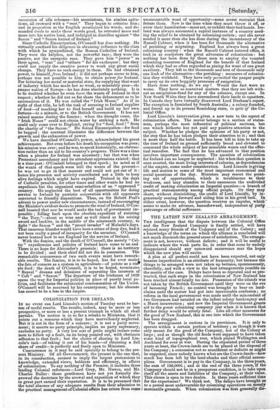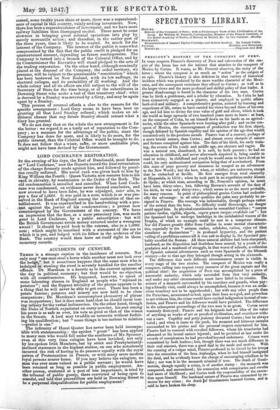THE LATEST NEW ZEALAND ARRANGEMENT. THE intelligence that the dispute
between the Colonial Office and the New Zealand Company is finally settled, will have rejoiced many friends of the Company and of the Colony ; and a knowledge of the terms on which the alliance is concluded will not much diminish the general sense of satisfaction. The arrange- ment is not, however, without defects ; and it will be useful to indicate where the weak parts lie, in order that none be unduly disappointed should any untoward occurrence mar the hopes which the new plan will excite.
A plan at all perfect could not have been expected, not only because imperfection is an attribute of humanity, but because the things to be arranged were not taken up betimes, spontaneously, cheerfully, and with a view to the best arrangements possible on the merits of the case. Delays have been so repeated and so pro- tracted, that each stage in the colonization of New Zealand has been reached almost fatally too late. Possession of the islands was not taken by the British Government until they were on the eve of becoming French ; no control was brought to bear on land- claims until the matter had got into inextricable confusion ; no reform in the local government was made until the misconduct of two Governors had entailed on the infant colony bankruptcy and a Maori insurrection ; and now the Imperial Government grants aid to the great colonizing company just when it is known that further delay would be utterly fatal. Like all other measures for the good of New Zealand, this is one into which the Government has been dragged.
The arrangement is curious in its provisions. It is only to operate within a certain portion of territory ; as though it were only meant for the good of the Company, not of the Colony at large ; and as though the old feuds were supposed to have taken some kind of topographical root, which placed Wellington and Auckland for ever at war. During the stipulated period of three years at least, the Crown-lands are to be placed at the disposal of the Company ; a concession not so munificent or definite as might be supposed, since nobody knows what are the Crown-lands—how much has been left by the land-sharks and their official accom- plices. Government is to pay to the Company, in the three years, the sum of 136,0001.; and at the end of the three years if the Company should not be in a prosperous condition, is to take upon itself all the assets and liabilities of the Company, at their value. This clause is open to two doubts. Is three years sufficient time for the experiment? We think not. The delays have brought us to a period most unfavourable for colonizing operations on merely mercantile grounds. When colonization was first generally dis- cussed, some twelve years since or more, there was a superabund- ance of capital in this country, vainly seeking investment. Now, there has been a superabundance of investment, and we have more railway liabilities than disengaged capital. There must be some slowness in bringing great colonial operations into play by merely mercantile action ; and therefore, in the earlier part of the three years time is likely to be wasted. So much for the interest of the oompany. The interest of the public is somewhat compromised by the fact that the public credit is pledged for an unascertained amount, depending on future contingencies. The Company is turned into a branch of the Colonial Office and by its Commissioner the Executive will stand pledged to the acts of the trading corporation. On the other hand, although nominally placed at the disposal of the Company, the ceded territory, we presume, will be subject to the questionable "constitution" which has been bestowed on New Zealand, with its low suffrage, its electoral colleges, and its probability of ill working. And the whole colony and all its affairs are still subject to the will of the Secretary of State for the time being or of the subordinates in Downing Street who make a tool of :hat transitory chief: what is decreed by a Stanley was reversed by a Grey, and may be again upset by a Stanley. This process of reversal affords a clue to the reasons for the specific arrangement : Lord Grey seems to have been bent on granting all that Lord Stanley refused ; which makes an ad- ditional chance that any future Stanley should retract what a Grey has granted. We do not deny that on the whole the new arrangement is for the better : we regard it as a tardy act of reparation to the Com- pany; as a measure for the advantage of the public, since the Company has done far more, and is likely to do more, for the public interest, than the Colonial Office would be brought to do. It does not follow that a wiser, saibr, or more creditable plan, might not have been devised by the Government.



























 Previous page
Previous page